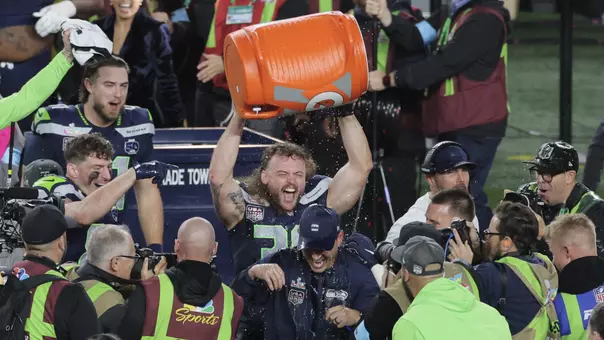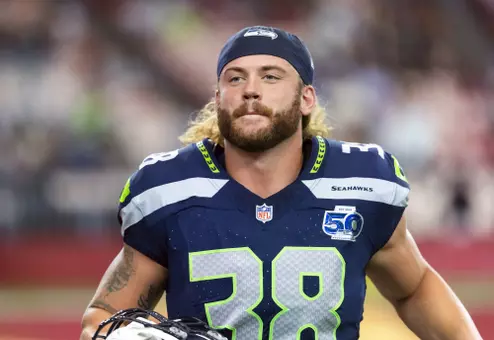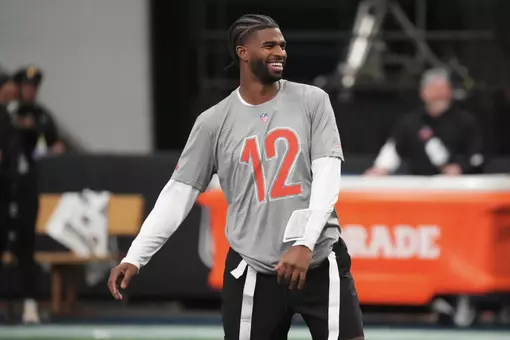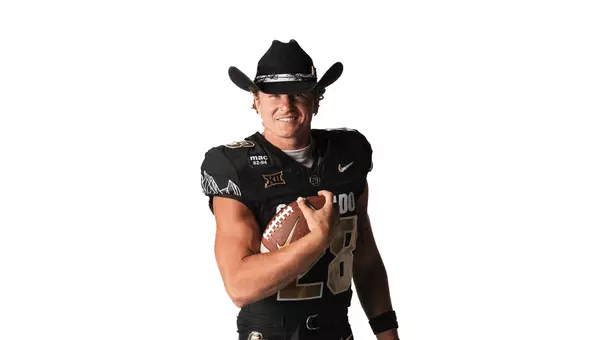Colorado University Athletics

Photo by: CUBuffs.com
Bill Collins, CU's First Black Football Captain, Passes Away
August 04, 2025 | Football, Alumni C Club
One of CU's stars in '69 Liberty Bowl Was 76
BOULDER – Bill Collins, charged by his fellow tri-captains with participating in perhaps the most courageous and bravest moment in University of Colorado athletic history, passed away last Thursday, July 31 in Dallas, Texas after a long battle with cancer. He was 76.
Colorado was 7-3 in 1969 and earned an invitation to play in the Liberty Bowl in Memphis, with Alabama (6-4) the opponent. But in the south in 1960's, teams with black players were almost always not welcome, by the teams, their universities and unfortunately much of their fan bases. There were seven African-Americans on the CU roster, as well as the program's first black assistant coach.
Collins, an African-American, was CU's first-ever black captain for a full season and one of the tri-captains on the '69 team. Thus, they represented the Buffs at the pregame coin toss. Alabama, yet to ever have a single black player on its roster, countered by sending over 40 white players out for the toss. The two other CU captains, Bobby Anderson and Mike Pruett, seeing this, devised a quick plan amongst the three, then stopped a few yards short to let Collins take the last few steps to midfield. Collins then approached the Tide horde solo to prove that he – and the Buffs – were not going to be intimidated by their racist, childish antics, starting with some Alabama fans spitting on the CU team as they took the field through a tunnel, and yelling the "N" word at the CU bench and sideline, which lasted all game long.
(You can see the coin toss at the 9:10 mark here: https://www.youtube.com/watch?v=RBNX8L5RTIA&t=974s) and here https://www.youtube.com/watch?v=oi68jrI8QzQ. Collins called tails and won the toss, by the way.)
At halftime, head coach Eddie Crowder and defensive tackle Bill Brundige gave passionate speeches about how CU's black players were being treated. Brundige, normally reserved, banged lockers and screamed, "Do you hear what they are calling our black brothers?!"
The Tide rallied from a 31-19 halftime deficit to briefly take a 33-31 lead, but the Buffs regrouped and scored the game's final 16 points to earn a 47-33 win. Brundige finished with a team-high 15 tackles – and to this day, still a school record five quarterback sacks, with Collins right behind him, making 14 stops – still the fourth-most in CU bowl history – also with half a sack to his credit. CU sacked 'Bama quarterbacks eight times, including once for a fourth quarter safety.
"Bill Collins was a great teammate and friend during our time at CU and after," said teammate and College Football Hall of Famer Bobby Anderson. "Bill took that courageous walk to midfield for the coin toss by himself when Alabama had sent out the entire 40 some all-white players to represent them that no one associated with our team will ever forget.
"Bill made a conscious effort to help unite Black and White players during our seasons at CU," Anderson continued. "He helped us understand the loyalty and brotherhood of the Black players at the same time being an example to keep the unity and success of the team as a priority. Bill had a great career with the Tony Evans Ministries and was very proud of his family. I'm thankful that Bill chose to walk on at Colorado and be a Buffalo. As good as he was as a freshman, we were surprised to find out later he was there without a scholarship. Eddie Crowder offered his scholarship to return to CU for his next semester and be with the team for spring ball.
"My prayers go out to Esther and his family, and I'll always cherish our friendship."
"Bill Collins was and is a wonderful human being and leader and follower with a great spiritual sense and knowledge with a situational awareness for working with people being present and caring for others, the community, and the environment he knew he was a part of and affected," said Collins' teammate of four seasons, cornerback Eric Harris. "His enthusiasm for life doing and striving to be your personal best in life was infectious because of the integrity he embodied with every step he took and as he spoke to move himself and those around him toward a better place and understanding for how we contribute to our being, and that being of others with integrity and love. Whatever he was doing or charged with being involved with, we all knew that he would be bringing his entire spirit, mind and body to the task at hand.
"He lived life that way and brought this into the relationships he had with people, places, and things he would interact with making and leaving it in a better place and state for his involvement contribution and contact.
"When speaking of contact, this was his nickname, 'Contact,' Harris added. "His play in the game of football was no different than the way he lived his life, being completely connected in the moment, and having been contacted by him. Tackling is an integral part of playing the game of football, and he demonstrated this very well. He got the nickname 'Contact' because when an opponent had to face off with him, and would think for an instant or hesitate, he would be already beaten or tackled, and experienced the overwhelming contact made by Bill Collins. His stats were evidence of this on and off the field."
"While a couple years behind our class, Bill made an impression on us all," said CU Athletic Hall of Fame defensive tackle Ron Scott. "A muscular, hard worker with a happy personality. It was fun to see him develop to become a stalwart for the Buffs. I believe he earned second-team conference recognition, but easily should have been a first-team choice. I don't know who could have beat him out for that top honor, but regardless, he was truly a very good player for the Buffaloes."
He did earn second-team All-Big Eight honors as a senior in 1969, and was also the conference's player of the week in CU's 35-14 win over Tulsa in the season opener at Folsom Field on Sept. 20. After moving over from nose guard to defensive tackle, he recorded 23 tackles (7 unassisted) with a Denver Post story adding that he also "tacked on a relentless pass rush that doesn't show in the statistics (known as hurries or pressures today)." The 23 tackles tied the school record at the time and are still tied for the ninth-most in Colorado history.
A walk-on from Houston, he shined in four freshman football games in 1966, and was going home for the holidays. But he informed Crowder that his family couldn't afford him to return to school, and Crowder, pleased with his performance and development, put him on immediate scholarship, a promise he had made during the recruiting process, which Collins had engineered himself. He had some interest from a couple of smaller schools in Texas, but essentially wasn't recruited by major colleges, so he took the initiative to write several colleges about the possibility of earning a scholarship. Only two schools responded – Colorado and Purdue – and both promised him a tryout and the opportunity to earn a scholarship after enrolling on his own. Crowder and the school followed through.
Collins had never been out of Texas until he boarded a train that brought him to Denver in August of 1966.
He would go on to letter the next three seasons at defensive tackle and linebacker on the varsity, helping CU to a 21-11 record (13-8 in Big Eight Conference play), and two bowl wins, over Miami in the '67 Bluebonnet (31-21) and Alabama. Collins worked his way into the lineup as a regular his sophomore season, finishing with 21 tackles that included four for losses alone against Kansas State late in the year.
He especially cherished the bowl win over Miami, with the game in his native Houston and Collins being the only player that was from there on the CU roster. The game, then held in Rice Stadium, was one he could never afford a ticket to attend, though he did play there once in a high school all-star game.
Collins recorded 167 tackles in his CU career (57 solo, 11 for losses with five quarterback sacks) and eight pass deflections in 25 games (he missed seven games due to injuries); in addition to the monster game he against Tulsa his senior year, he also had 15 stops against Nebraska later in that season.
He did not go on to play professionally, graduating from CU with a bachelor's degree in Business in the spring of 1970. He was hired by IBM out of college and went to work for Xerox in 1971, beginning what would be an executive on many levels for 35 years, retiring as the company's vice president and general manager for the state of Texas in 2006. Six months later, he began a new career with The Urban Alternative, where he served until his passing. He also volunteered his time with the Oakcliff Bible Fellowship and the Tony Evans Ministries.
The Oakcliff Bible Fellowship posted this statement about him:
"Elder Bill Collins was a devoted husband, father, grandfather, friend, leader, and a mighty man of God.
He faithfully served as an elder at OCBF, where his wisdom, strength, and spiritual leadership left a lasting impact. Throughout the years, he served in numerous ministries and on several committees, always offering his time, heart, and insight to the work of the Kingdom.
"A passionate advocate for ministry, he championed the Oak Cliff Federal Christian Credit Union, supported the Worship Ministry, and played a vital role on the Elder Board—collaborating with fellow elders for many years to help lead and guide the church. His voice, his leadership, and his presence will be deeply missed, yet his legacy will continue to inspire and influence generations to come."
William Elgert Collins was born on December 29, 1948 in Houston, the son of Arnold and Eva Mae Collins. He graduated from Carver High School where he was an all-conference performer in football and baseball.
He is survived by his wife of 45 years, Esther D., seven children, daughters Tammy Franklin Kirk), Da'Vidra West, Tamara Collins, Dawn Wilburn, Kimberly Tripp (Derrick), Celeste Howell (Keith) and son William "Bill" III (Novelette), 21 grandchildren: Kerrion, Carrington (Maxx), Caziah (Alena), Kennedy, Micah, Brandon, Andrew, Imani, Derrick II, Kelise, Gideon-Michael, William III, Caleb, Stephen-Gabriel, Evadney, John-Alan, Dylan, Kendyl, Kason, Kenzlie, Keith III and two great-grandchildren (Shiloh and Levi Noelle).
A celebration of life is set for later this week. A public viewing Wednesday from 3-8 p.m. (CDT) at Evergreen Funeral Home (6449 University Hills Blvd., Dallas, TX 75241). The celebratory service is Thursday (Aug. 7), with viewing from 9:30-11 a.m. followed by the celebration of life at the Oakcliff Bible Fellowship, 1660 West Camp Wisdom Road, Dallas, 75232. The family invites those attending to wear hues of blue and tan, Bill's favorite colors; card and gifts can be sent to 1201 Frost Hollow Drive, DeSoto, TX 75115.
(Note: in the 1950's, the coaches selected the captains on a game-by-game basis; no doubt CU's first African-American players – Frank Clarke and College Hall of Famer John Wooten – at one if not multiple times were chosen to represent the team. But Collins was the first chosen by his teammates for an entire season.)
Colorado was 7-3 in 1969 and earned an invitation to play in the Liberty Bowl in Memphis, with Alabama (6-4) the opponent. But in the south in 1960's, teams with black players were almost always not welcome, by the teams, their universities and unfortunately much of their fan bases. There were seven African-Americans on the CU roster, as well as the program's first black assistant coach.
Collins, an African-American, was CU's first-ever black captain for a full season and one of the tri-captains on the '69 team. Thus, they represented the Buffs at the pregame coin toss. Alabama, yet to ever have a single black player on its roster, countered by sending over 40 white players out for the toss. The two other CU captains, Bobby Anderson and Mike Pruett, seeing this, devised a quick plan amongst the three, then stopped a few yards short to let Collins take the last few steps to midfield. Collins then approached the Tide horde solo to prove that he – and the Buffs – were not going to be intimidated by their racist, childish antics, starting with some Alabama fans spitting on the CU team as they took the field through a tunnel, and yelling the "N" word at the CU bench and sideline, which lasted all game long.
(You can see the coin toss at the 9:10 mark here: https://www.youtube.com/watch?v=RBNX8L5RTIA&t=974s) and here https://www.youtube.com/watch?v=oi68jrI8QzQ. Collins called tails and won the toss, by the way.)
At halftime, head coach Eddie Crowder and defensive tackle Bill Brundige gave passionate speeches about how CU's black players were being treated. Brundige, normally reserved, banged lockers and screamed, "Do you hear what they are calling our black brothers?!"
The Tide rallied from a 31-19 halftime deficit to briefly take a 33-31 lead, but the Buffs regrouped and scored the game's final 16 points to earn a 47-33 win. Brundige finished with a team-high 15 tackles – and to this day, still a school record five quarterback sacks, with Collins right behind him, making 14 stops – still the fourth-most in CU bowl history – also with half a sack to his credit. CU sacked 'Bama quarterbacks eight times, including once for a fourth quarter safety.
"Bill Collins was a great teammate and friend during our time at CU and after," said teammate and College Football Hall of Famer Bobby Anderson. "Bill took that courageous walk to midfield for the coin toss by himself when Alabama had sent out the entire 40 some all-white players to represent them that no one associated with our team will ever forget.
"Bill made a conscious effort to help unite Black and White players during our seasons at CU," Anderson continued. "He helped us understand the loyalty and brotherhood of the Black players at the same time being an example to keep the unity and success of the team as a priority. Bill had a great career with the Tony Evans Ministries and was very proud of his family. I'm thankful that Bill chose to walk on at Colorado and be a Buffalo. As good as he was as a freshman, we were surprised to find out later he was there without a scholarship. Eddie Crowder offered his scholarship to return to CU for his next semester and be with the team for spring ball.
"My prayers go out to Esther and his family, and I'll always cherish our friendship."
"Bill Collins was and is a wonderful human being and leader and follower with a great spiritual sense and knowledge with a situational awareness for working with people being present and caring for others, the community, and the environment he knew he was a part of and affected," said Collins' teammate of four seasons, cornerback Eric Harris. "His enthusiasm for life doing and striving to be your personal best in life was infectious because of the integrity he embodied with every step he took and as he spoke to move himself and those around him toward a better place and understanding for how we contribute to our being, and that being of others with integrity and love. Whatever he was doing or charged with being involved with, we all knew that he would be bringing his entire spirit, mind and body to the task at hand.
"He lived life that way and brought this into the relationships he had with people, places, and things he would interact with making and leaving it in a better place and state for his involvement contribution and contact.
"When speaking of contact, this was his nickname, 'Contact,' Harris added. "His play in the game of football was no different than the way he lived his life, being completely connected in the moment, and having been contacted by him. Tackling is an integral part of playing the game of football, and he demonstrated this very well. He got the nickname 'Contact' because when an opponent had to face off with him, and would think for an instant or hesitate, he would be already beaten or tackled, and experienced the overwhelming contact made by Bill Collins. His stats were evidence of this on and off the field."
"While a couple years behind our class, Bill made an impression on us all," said CU Athletic Hall of Fame defensive tackle Ron Scott. "A muscular, hard worker with a happy personality. It was fun to see him develop to become a stalwart for the Buffs. I believe he earned second-team conference recognition, but easily should have been a first-team choice. I don't know who could have beat him out for that top honor, but regardless, he was truly a very good player for the Buffaloes."
He did earn second-team All-Big Eight honors as a senior in 1969, and was also the conference's player of the week in CU's 35-14 win over Tulsa in the season opener at Folsom Field on Sept. 20. After moving over from nose guard to defensive tackle, he recorded 23 tackles (7 unassisted) with a Denver Post story adding that he also "tacked on a relentless pass rush that doesn't show in the statistics (known as hurries or pressures today)." The 23 tackles tied the school record at the time and are still tied for the ninth-most in Colorado history.
A walk-on from Houston, he shined in four freshman football games in 1966, and was going home for the holidays. But he informed Crowder that his family couldn't afford him to return to school, and Crowder, pleased with his performance and development, put him on immediate scholarship, a promise he had made during the recruiting process, which Collins had engineered himself. He had some interest from a couple of smaller schools in Texas, but essentially wasn't recruited by major colleges, so he took the initiative to write several colleges about the possibility of earning a scholarship. Only two schools responded – Colorado and Purdue – and both promised him a tryout and the opportunity to earn a scholarship after enrolling on his own. Crowder and the school followed through.
Collins had never been out of Texas until he boarded a train that brought him to Denver in August of 1966.
He would go on to letter the next three seasons at defensive tackle and linebacker on the varsity, helping CU to a 21-11 record (13-8 in Big Eight Conference play), and two bowl wins, over Miami in the '67 Bluebonnet (31-21) and Alabama. Collins worked his way into the lineup as a regular his sophomore season, finishing with 21 tackles that included four for losses alone against Kansas State late in the year.
He especially cherished the bowl win over Miami, with the game in his native Houston and Collins being the only player that was from there on the CU roster. The game, then held in Rice Stadium, was one he could never afford a ticket to attend, though he did play there once in a high school all-star game.
Collins recorded 167 tackles in his CU career (57 solo, 11 for losses with five quarterback sacks) and eight pass deflections in 25 games (he missed seven games due to injuries); in addition to the monster game he against Tulsa his senior year, he also had 15 stops against Nebraska later in that season.
He did not go on to play professionally, graduating from CU with a bachelor's degree in Business in the spring of 1970. He was hired by IBM out of college and went to work for Xerox in 1971, beginning what would be an executive on many levels for 35 years, retiring as the company's vice president and general manager for the state of Texas in 2006. Six months later, he began a new career with The Urban Alternative, where he served until his passing. He also volunteered his time with the Oakcliff Bible Fellowship and the Tony Evans Ministries.
The Oakcliff Bible Fellowship posted this statement about him:
"Elder Bill Collins was a devoted husband, father, grandfather, friend, leader, and a mighty man of God.
He faithfully served as an elder at OCBF, where his wisdom, strength, and spiritual leadership left a lasting impact. Throughout the years, he served in numerous ministries and on several committees, always offering his time, heart, and insight to the work of the Kingdom.
"A passionate advocate for ministry, he championed the Oak Cliff Federal Christian Credit Union, supported the Worship Ministry, and played a vital role on the Elder Board—collaborating with fellow elders for many years to help lead and guide the church. His voice, his leadership, and his presence will be deeply missed, yet his legacy will continue to inspire and influence generations to come."
William Elgert Collins was born on December 29, 1948 in Houston, the son of Arnold and Eva Mae Collins. He graduated from Carver High School where he was an all-conference performer in football and baseball.
He is survived by his wife of 45 years, Esther D., seven children, daughters Tammy Franklin Kirk), Da'Vidra West, Tamara Collins, Dawn Wilburn, Kimberly Tripp (Derrick), Celeste Howell (Keith) and son William "Bill" III (Novelette), 21 grandchildren: Kerrion, Carrington (Maxx), Caziah (Alena), Kennedy, Micah, Brandon, Andrew, Imani, Derrick II, Kelise, Gideon-Michael, William III, Caleb, Stephen-Gabriel, Evadney, John-Alan, Dylan, Kendyl, Kason, Kenzlie, Keith III and two great-grandchildren (Shiloh and Levi Noelle).
A celebration of life is set for later this week. A public viewing Wednesday from 3-8 p.m. (CDT) at Evergreen Funeral Home (6449 University Hills Blvd., Dallas, TX 75241). The celebratory service is Thursday (Aug. 7), with viewing from 9:30-11 a.m. followed by the celebration of life at the Oakcliff Bible Fellowship, 1660 West Camp Wisdom Road, Dallas, 75232. The family invites those attending to wear hues of blue and tan, Bill's favorite colors; card and gifts can be sent to 1201 Frost Hollow Drive, DeSoto, TX 75115.
(Note: in the 1950's, the coaches selected the captains on a game-by-game basis; no doubt CU's first African-American players – Frank Clarke and College Hall of Famer John Wooten – at one if not multiple times were chosen to represent the team. But Collins was the first chosen by his teammates for an entire season.)
Colorado Football Postgame Press Conference
Saturday, November 29
Mark Johnson & Gary Barnett breakdown Arizona State game | The Buffalo Stampede: Colorado Football
Sunday, November 23
Colorado Football Postgame Press Conference | Arizona State
Sunday, November 23
Mark Johnson & Gary Barnett recap the game at WVU | The Buffalo Stampede: Colorado Football
Saturday, November 08





